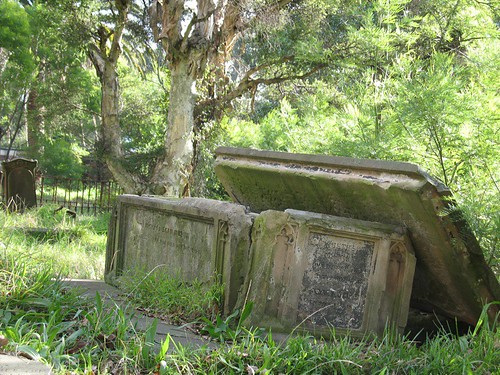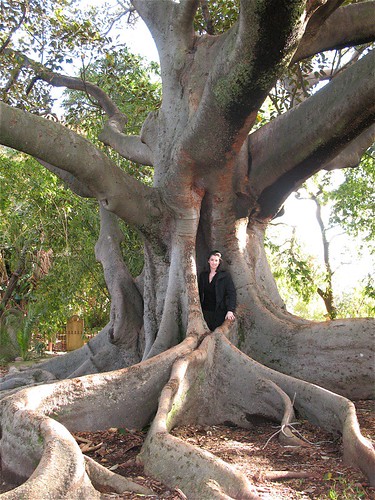Ace Navigation
Many days, I vary my route home in the hopes of discovering something interesting. Things I’d never otherwise find.
This habit also has the effect of getting me lost sometimes (rather often, really), for long, wandering periods of time, as I have a truly lamentable sense of direction. Resistant to improvement, I’ve adapted to this by cultivating an enthusiasm for exploring new places. And a tendency to carry food & water with me wherever I go. I hold fast to Buckaroo Bonzai’s koan:
On one such wander, I happened upon a fantastic old cemetery in the green shade of ancient Morton bay fig trees (above). The headstones are all rust-weeping native sandstone furred over with green moss & orange lichen. The very first grave I stooped to read belonged to a William Dawes.
Lieutenant William Dawes? I rocked back on my heels. No. It can’t be. Although it could.... William Dawes was there—here—when my characters arrived in 1790. He was among the cleverest, kindest officers of the first fleet, the astronomer & ace navigator who worked at his observatory on Dawes Point (a magical promontory now supporting one foot of the Harbour Bridge). The date...well, the date on the stone is hard to read, but what I can make out is not strictly impossible...is it?
There isn’t a whole lot written about Dawes—he didn’t keep a surviving journal of his own—so he can float unqualified & unstained by detail in the few anecdotes & lovely adjectives that other officers ascribed to him in their journals. He was smart, deeply moral, & one of the only people that everyone seemed to like.
More interestingly, though, Dawes compiled a short lexicon of Aboriginal words, among the first ever. He did this with a native woman, Patye, who was his companion & probably his lover. It looks complied incidentally, rather than methodically. That's to say, he didn’t go at it from A to Z, or in order of military importance, or with a specific agenda. He seems to have recorded words, phrases & concepts as he learned them from her, as they naturally came up between them.
So you do get an unintentional, telegraphic sort of journal, a list that preserves the tone & subjects of their interactions, which are sometimes funny, coy or curt, occasionally lovely, & ultimately touching. My favorite—though I don’t have the text in front of me & so can’t quote it—is a native word describing some aspect of this: warming another’s chilled fingers by heating your own hands at the fire & then gently clasping theirs.
Oddly, I feel as if I know this man a little, maybe in the way you come to know characters of great novels. So here I’ve lost & then found myself in Dawes' old hiking grounds (now an urban center), wandered into the green graves around a corner, & suddenly: his headstone. This is a sign, I say to myself. A great & worthy sign.
We aren't so complicated really: all I need is good food & exercise, fresh air & social contact, the time & peace to do my work, & highly symbolic chance encounters with 200 year old intimates to sustain me. Basic mammalian stuff.

Epilogue
Of course none of it is true.
For when I snap out of it the next day—one of the librarians in my deepest brain cells shoots up a cranky note via pneumatic tube to my conscious awareness—I know this just can’t be right. Thinking about him doesn't summon him like this. Wanting that 6 to be a 2 doesn't make it so. It's got to be another William Dawes. So I go back. And it is. For one thing: my Dawes was buried in Europe. This is some other guy of the same name & century, maybe someone with a great story, too, but I don’t know him at all.
Still, I enjoyed the mistaken delight while it lasted.
This habit also has the effect of getting me lost sometimes (rather often, really), for long, wandering periods of time, as I have a truly lamentable sense of direction. Resistant to improvement, I’ve adapted to this by cultivating an enthusiasm for exploring new places. And a tendency to carry food & water with me wherever I go. I hold fast to Buckaroo Bonzai’s koan:
“Wherever you go, there you are.”
On one such wander, I happened upon a fantastic old cemetery in the green shade of ancient Morton bay fig trees (above). The headstones are all rust-weeping native sandstone furred over with green moss & orange lichen. The very first grave I stooped to read belonged to a William Dawes.
Lieutenant William Dawes? I rocked back on my heels. No. It can’t be. Although it could.... William Dawes was there—here—when my characters arrived in 1790. He was among the cleverest, kindest officers of the first fleet, the astronomer & ace navigator who worked at his observatory on Dawes Point (a magical promontory now supporting one foot of the Harbour Bridge). The date...well, the date on the stone is hard to read, but what I can make out is not strictly impossible...is it?
There isn’t a whole lot written about Dawes—he didn’t keep a surviving journal of his own—so he can float unqualified & unstained by detail in the few anecdotes & lovely adjectives that other officers ascribed to him in their journals. He was smart, deeply moral, & one of the only people that everyone seemed to like.
More interestingly, though, Dawes compiled a short lexicon of Aboriginal words, among the first ever. He did this with a native woman, Patye, who was his companion & probably his lover. It looks complied incidentally, rather than methodically. That's to say, he didn’t go at it from A to Z, or in order of military importance, or with a specific agenda. He seems to have recorded words, phrases & concepts as he learned them from her, as they naturally came up between them.
So you do get an unintentional, telegraphic sort of journal, a list that preserves the tone & subjects of their interactions, which are sometimes funny, coy or curt, occasionally lovely, & ultimately touching. My favorite—though I don’t have the text in front of me & so can’t quote it—is a native word describing some aspect of this: warming another’s chilled fingers by heating your own hands at the fire & then gently clasping theirs.
Oddly, I feel as if I know this man a little, maybe in the way you come to know characters of great novels. So here I’ve lost & then found myself in Dawes' old hiking grounds (now an urban center), wandered into the green graves around a corner, & suddenly: his headstone. This is a sign, I say to myself. A great & worthy sign.
We aren't so complicated really: all I need is good food & exercise, fresh air & social contact, the time & peace to do my work, & highly symbolic chance encounters with 200 year old intimates to sustain me. Basic mammalian stuff.

Epilogue
Of course none of it is true.
For when I snap out of it the next day—one of the librarians in my deepest brain cells shoots up a cranky note via pneumatic tube to my conscious awareness—I know this just can’t be right. Thinking about him doesn't summon him like this. Wanting that 6 to be a 2 doesn't make it so. It's got to be another William Dawes. So I go back. And it is. For one thing: my Dawes was buried in Europe. This is some other guy of the same name & century, maybe someone with a great story, too, but I don’t know him at all.
Still, I enjoyed the mistaken delight while it lasted.


1 Comments:
That's the problem with research. All those silly facts get in the way of the magic. (Same comment on the previous pose about the sentence you love that had to get cut.)
Post a Comment
<< Home